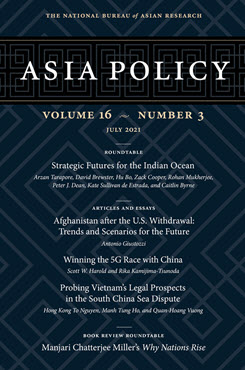Winning the 5G Race with China
A U.S.-Japan Strategy to Trip the Competition, Run Faster, and Put the Fix In
This article argues that China’s 5G wireless information and communications technology (ICT) poses serious risks to privacy and national security and describes a potential U.S.-Japan strategy for countering these threats.
EXECUTIVE SUMMARY
MAIN ARGUMENT
Chinese leaders have promoted 5G ICT as a component of both the Belt and Road Initiative and Military-Civil Fusion—efforts intended to extend China’s influence around the world for national, commercial, and military advantage. Under Chinese law, 5G ICT firms like Huawei and ZTE are required to grant Chinese authorities access to any data that touches their systems. In response, the U.S. and Japan should consider working to counter the advantages of Chinese firms by cutting off their access to key markets, technology inputs, talent, and capital (“tripping the competition”); build up free-world alternatives (“running faster”); and restructure the global playing field to protect privacy, economic competition, and national security (“putting the fix in”).
POLICY IMPLICATIONS
- To reduce Chinese firms’ market access, the U.S. and Japan have focused on expelling untrustworthy Chinese 5G technology from their ICT markets, tightening foreign investment review processes, enhancing visa screening and working with universities to counter Chinese intellectual property theft and talent recruitment, and ensuring that Chinese 5G firms are unable to draw on allied capital markets to fund their expansion.
- To provide alternatives to Chinese 5G ICT, Washington and Tokyo are actively investing in secure and resilient 5G technologies and using these as a bridge to 6G solutions, while leveraging export promotion and development finance tools to help these technologies spread in third-country markets.
- To balance privacy, economic competition, and national security, the U.S. and Japan can promote Open Radio Access Network (O-RAN) and virtualized core technology solutions to restructure wireless markets, while also working with partners to advocate for data privacy norms embodied in international standard-setting institutions.
Scott W. Harold is a Senior Political Scientist at the RAND Corporation, an Adjunct Professor of Security Studies in the Edmund A. Walsh School of Foreign Service at Georgetown University, and an Adjunct Professor of International Affairs at the School of International and Public Affairs at Columbia University (United States). He is a member of Cohort V of the Maureen and Mike Mansfield Foundation’s U.S.-Japan Network for the Future and a former term member at the Council on Foreign Relations.
Rika Kamijima-Tsunoda is a master’s degree candidate at the John F. Kennedy School of Government at Harvard University (United States). In 2020, she was a visiting research fellow in the Asia Program at the Carnegie Endowment for International Peace.
About Asia Policy
Asia Policy is a peer-reviewed scholarly journal presenting policy-relevant academic research on the Asia-Pacific that draws clear and concise conclusions useful to today’s policymakers. Asia Policy is published quarterly in January, April, July, and October and accepts submissions on a rolling basis. Learn more


